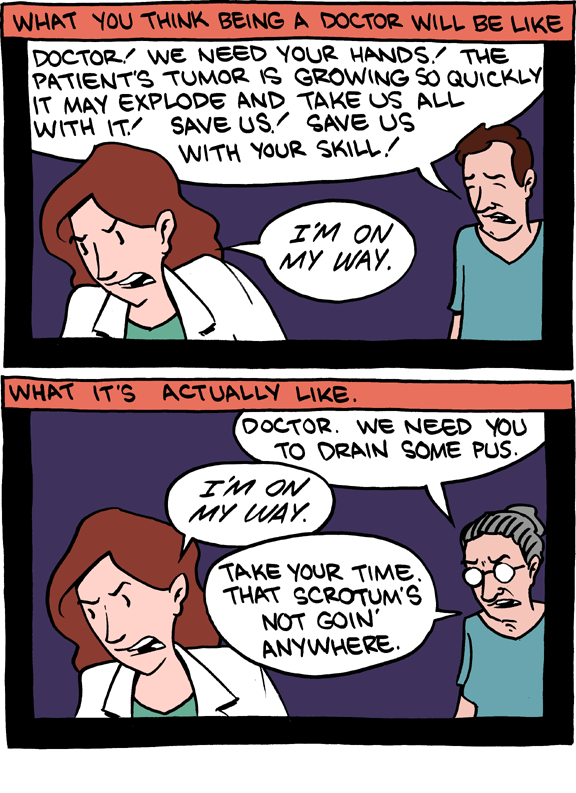October 9th, 2011 by Shadowfax in Opinion, True Stories
No Comments »

My father in law, now deceased, was a nephrologist. I met him while I was in medical school. He was a reserved guy, not prone to butt into what he saw as others’ business. So I still remember that while I was considering what sort of residency to pursue, he took a surprisingly strong stance that I should go into interventional radiology. His reasoning was simple: they have a great lifestyle, they make bags and bags and bags of money, and they get to play with all the coolest gadgets.
It was tempting, I admit. As anyone who knows me can attest, I am ALL about the gadgets. I’m not averse to bags of money either. But I never gave it much consideration, mostly because I am just not real good at radiology, though for an ER doc I do OK. (A low bar, it is true.)
I sometimes regret that decision. For example, I wrote the other day about a gentleman who presented with a ruptured abdominal aortic aneurysm. We had some heroic fun in the ER resuscitating him and getting him to the OR. After the fact, I had to wonder whether it was all in vain — Read more »
*This blog post was originally published at Movin' Meat*
October 4th, 2011 by Shadowfax in Humor
No Comments »

Lest the students out there get disillusioned, it is probably a good idea to be upfront about the reality of being a doctor:

Maybe it’s not always this bad, but in the ER there is a real ring of truth to this.
From the marvelous Saturday Morning Breakfast Cereal
*This blog post was originally published at Movin' Meat*
September 29th, 2011 by PreparedPatient in Health Tips, True Stories
No Comments »

Whether caused by injury, surgery or a toothache so bad it slams you awake in the middle of the night, acute pain is difficult. Receiving prompt and helpful treatment can make all the difference in the world. But lack of care or inadequate care means that the acute pain may develop into chronic agony.
Fortunately, acute pain is not always long lasting or overwhelming, such as when you have a short severe cramp or multiple bee stings that can be handled with time, over-the-counter medication and other home remedies [See: Pain Treatment Options].
Since individuals’ tolerance for pain varies widely, the question of when pain itself requires urgent medical attention is difficult to answer. Chest pain should prompt a visit to the emergency room, of course—but other types of pain are trickier to call. Read more »
*This blog post was originally published at Prepared Patient Forum: What It Takes Blog*
September 28th, 2011 by Emergiblog in News, Opinion
No Comments »

You know me.
I’m all over anything that is from the BBC.

But this is different.
There is no TARDIS. And there are nurses along with the doctor. Lots of nurses.
And the only people flying through time and space are the trauma patients before they hit the bus or the ground.
24 Hours in the ER premiered last night on BBC America. I received a copy of the first two episodes from BBC America unedited for American television. Of course in Great Britian, this was called “24 Hours in A&E”.
On a personal level, I like it. It reminds me of the old “Trauma in the ER”.
On a professional level, Read more »
*This blog post was originally published at Emergiblog*
September 24th, 2011 by Shadowfax in True Stories
No Comments »

A hard thing about being an ER doctor is that I know a little, sometimes very little, about a lot of things. When I am faced with a particular condition, I often need to call the specialist for that organ, who knows way way more about it than I ever will, and they all think I’m an idiot because I don’t know as much about their organ as they do. There’s a huge asymmetry of knowledge, and it can create some tension and conflict.
I’m OK with it, because I can ignore their condescension and I am secure with what I do know, and its limits. But sometimes I get perplexing instructions from the specialists. The emergency medicine dogma can be overbroad and a little hidebound and what the specialists will do in the real world often radically diverges from what the Emergency Medicine textbooks say to do. It’s often an interesting learning opportunity for me, especially when it’s a condition I don’t encounter that much. But I also have to work to maintain a flexible and open-minded attitude when I call a consultant and my side of the conversation consists of “Really? I didn’t know you did that for this…” You need to know and trust your colleagues in other specialties, and know when to call BS on them and push to do something else, which is really hard to do when you are talking to someone who is so much more of an expert than you are.
So I saw this guy recently, an urban hipster who was perhaps a bit too old to be riding his longboard on the hilly streets of our fair town. He didn’t seem to be too good at it, judging by the collection of crusted abrasions and aging ecchymoses he was sporting. He had been falling a lot recently — we only get about a month of sun here, so I guess he was making the most of the summer weather practicing his new hobby. He had a variety of complaints from Read more »
*This blog post was originally published at Movin' Meat*















